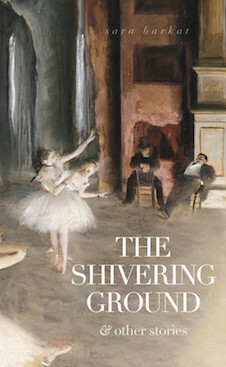The door had been there ever since Shelley could remember.
In the back of the walled garden, the path leading through brambles to come upon it, suddenly—first sunflowers in tilted rows, the tumble of stones and dirt turned over, spiderwebs strewn with dew; then, behind the brambles, past the pachysandra and ferns, up it came: the wall, and the doorway in red crumbling brick, and ivy. It had no keyhole, as a door should; nothing to peek through and wonder about: it had no knob at all—indeed, if it were not for the fact that it was, very clearly, a door; set within a frame, still with its weathered wood, splintered and greyed by years, it would not have seemed very much like a door at all. There was no indentation; no marks where a handle might once have been, and Shelley had spent long enough pulling her hands along the grasses by the wall’s end, poking amidst the dirt with sticks and pointed rocks. She would have found a handle, if it had fallen off or been thrown there; the way she had found the pottery, the broken bottles of glass, blue and green and brown, and put them in a pile in the old stone bird-feeder that was never filled with anything but a thin skim of muddy water and, in the autumn, a drift of leaves. Sometimes, she would lean her head very close to the ground as though maybe she could peer under the door, but it was flush with the brick, and the scree of dirt across it was never disturbed by as much as a runnel of water coming through.
So impenetrable was this door that it became the indefatigable imaginative resource: anything could be behind it, and sometimes was. On peaceful, sunny afternoons, she could hear the hooves of horses going by, and imagine lords and ladies dressed in their fine clothes as though in a mediaeval Romance; on grey, sullen days the washing on the line flapped as women bustled quickly out, glancing toward the sky, putting everything into baskets as fast as they could before those first, cold, unforgiving drops of rain.
Shelley had tapped on the door, too, and sometimes in the winter when the snowdrifts fell with great shuddering crackles, she could almost fancy that another little girl, quite like her, tapped back from the other side.
No one else saw the purpose of the door; for they did not venture so far into the wilds of the back garden, near the wall, in the corners. Perhaps, in truth, the most mundane possible explanations existed: but even those had their thrill. Another house, near their own, had once wanted a doorway from yard to yard, but after a feud had sawn off the handles; an artist with a flair for the mysterious had commissioned a false door to be built just for the occasion, never intending it to be opened at all.
In the mornings Shelley had her tutors and in the afternoons she played, but in the evening she sat with her family in the long, crooked dining room on the ground floor. It was a most peculiar room, and I am sure that most people would agree not a singularly pleasant one. For, long ago, it had been a hallway connecting the kitchen to other rooms in the house; and when the other walls had been knocked aside to create a photography studio of the rest of the floor, the hallway had been neglected: and so it was that it became a dining room.
